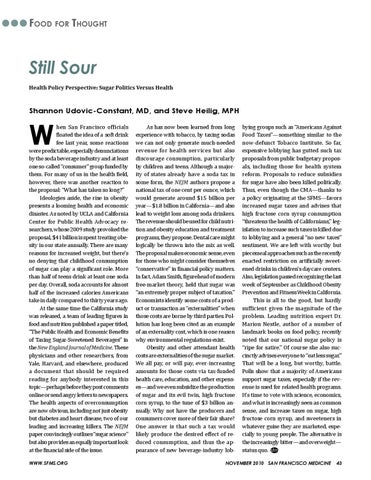Food for Thought
Still Sour Health Policy Perspective: Sugar Politics Versus Health
Shannon Udovic-Constant, MD, and Steve Heilig, MPH
W
hen San Francisco officials floated the idea of a soft drink fee last year, some reactions were predictable, especially denunciations by the soda beverage industry and at least one so-called “consumer” group funded by them. For many of us in the health field, however, there was another reaction to the proposal: “What has taken so long?” Ideologies aside, the rise in obesity presents a looming health and economic disaster. As noted by UCLA and California Center for Public Health Advocacy researchers, whose 2009 study provoked the proposal, $41 billion is spent treating obesity in our state annually. There are many reasons for increased weight, but there’s no denying that childhood consumption of sugar can play a significant role. More than half of teens drink at least one soda per day. Overall, soda accounts for almost half of the increased calories Americans take in daily compared to thirty years ago. At the same time the California study was released, a team of leading figures in food and nutrition published a paper titled, “The Public Health and Economic Benefits of Taxing Sugar-Sweetened Beverages” in the New England Journal of Medicine. These physicians and other researchers, from Yale, Harvard, and elsewhere, produced a document that should be required reading for anybody interested in this topic—perhaps before they post comments online or send angry letters to newspapers. The health aspects of overconsumption are now obvious, including not just obesity but diabetes and heart disease, two of our leading and increasing killers. The NEJM paper convincingly outlines “sugar science” but also provides an equally important look at the financial side of the issue. www.sfms.org
As has now been learned from long experience with tobacco, by taxing sodas we can not only generate much-needed revenue for health services but also discourage consumption, particularly by children and teens. Although a majority of states already have a soda tax in some form, the NEJM authors propose a national tax of one cent per ounce, which would generate around $15 billion per year—$1.8 billion in California—and also lead to weight loss among soda drinkers. The revenue should be used for child nutrition and obesity education and treatment programs, they propose. Dental care might logically be thrown into the mix as well. The proposal makes economic sense, even for those who might consider themselves “conservative” in financial policy matters. In fact, Adam Smith, figurehead of modern free-market theory, held that sugar was “an extremely proper subject of taxation.” Economists identify some costs of a product or transaction as “externalities” when those costs are borne by third parties. Pollution has long been cited as an example of an externality cost, which is one reason why environmental regulations exist. Obesity and other attendant health costs are externalities of the sugar market. We all pay, or will pay, ever-increasing amounts for those costs via tax-funded health care, education, and other expenses—and we even subsidize the production of sugar and its evil twin, high fructose corn syrup, to the tune of $3 billion annually. Why not have the producers and consumers cover more of their fair share? One answer is that such a tax would likely produce the desired effect of reduced consumption, and thus the appearance of new beverage-industry lob-
bying groups such as “Americans Against Food Taxes”—something similar to the now-defunct Tobacco Institute. So far, expensive lobbying has gutted such tax proposals from public budgetary proposals, including those for health system reform. Proposals to reduce subsidies for sugar have also been killed politically. Thus, even though the CMA—thanks to a policy originating at the SFMS—favors increased sugar taxes and advises that high fructose corn syrup consumption “threatens the health of Californians,” legislation to increase such taxes is killed due to lobbying and a general “no new taxes” sentiment. We are left with worthy but piecemeal approaches such as the recently enacted restriction on artificially sweetened drinks in children’s daycare centers. Also, legislation passed recognizing the last week of September as Childhood Obesity Prevention and Fitness Week in California. This is all to the good, but hardly sufficient given the magnitude of the problem. Leading nutrition expert Dr. Marion Nestle, author of a number of landmark books on food policy, recently noted that our national sugar policy is “ripe for satire.” Of course she also succinctly advises everyone to “eat less sugar.” That will be a long, but worthy, battle. Polls show that a majority of Americans support sugar taxes, especially if the revenue is used for related health programs. It’s time to vote with science, economics, and what is increasingly seen as common sense, and increase taxes on sugar, high fructose corn syrup, and sweeteners in whatever guise they are marketed, especially to young people. The alternative is the increasingly bitter—and overweight— status quo.
November 2010 San Francisco Medicine 43
